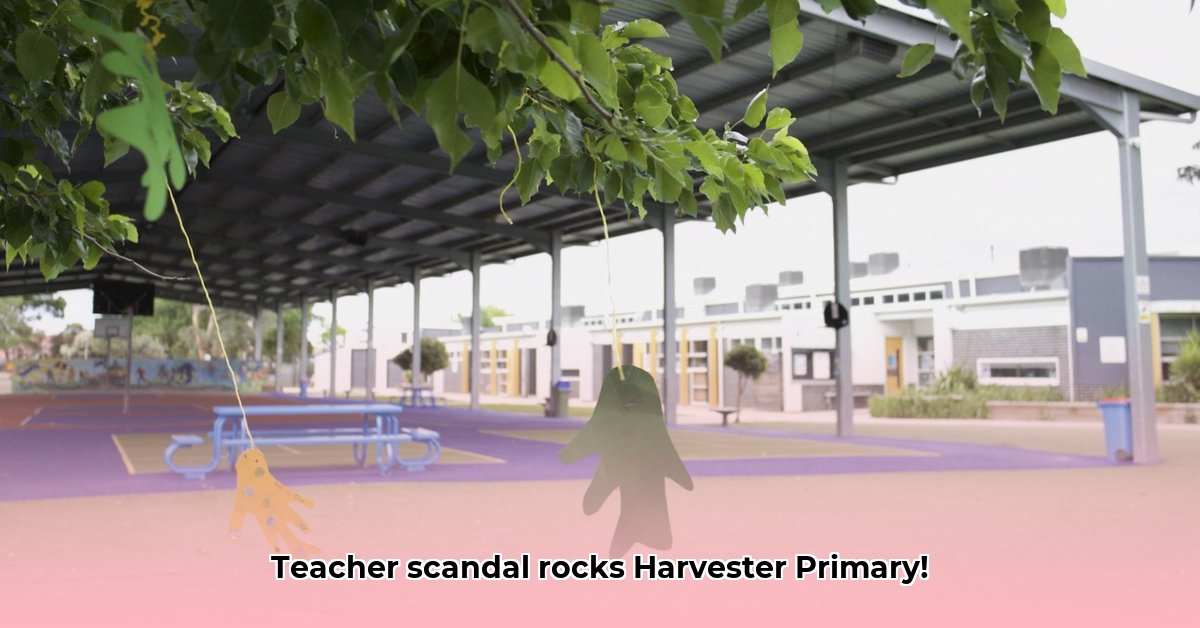
Harvester Primary School Teacher Allegations: A Community in Crisis
The recent allegations of inappropriate conduct against a teacher at Harvester Primary School in Mitchells Plain have sent shockwaves through the community and highlighted critical failings in child protection within our education system. A Grade 7 pupil alleges the teacher engaged in inappropriate behaviour, using platforms like WhatsApp and TikTok to send suggestive messages. This incident, regardless of the absence of any confirmed "Harvester Primary School Teacher Video" evidence, demands immediate and comprehensive action. The gravity of these allegations cannot be overstated, and the impact on the victim and the school community is profound.
The teacher's subsequent resignation does not diminish the severity of the situation. Parents are understandably outraged and deeply concerned about the safety of their children. This incident raises crucial questions about the effectiveness of existing child protection policies and procedures within the school and the broader Western Cape education system. What systemic failures allowed this to occur? Were reporting mechanisms adequate? Did the school provide a safe and accessible avenue for children to report such incidents? The involvement of the Western Cape Education Department (WCED) and the South African Police Service (SAPS) underscores the seriousness of these allegations and the need for a thorough investigation.
The Digital Dimension: A New Landscape of Risk
The alleged use of social media platforms like WhatsApp and TikTok underscores the evolving nature of child abuse. This incident serves as a stark reminder of how technology presents new challenges and opportunities for predatory behaviour. Our schools urgently require comprehensive digital literacy programmes, not only for learners but also for educators. Clear, unambiguous guidelines governing online communication between teachers and pupils are essential, and robust enforcement mechanisms must be implemented to ensure compliance.
Systemic Weaknesses: A Call for Reform
This case is not isolated; it points to deeper, systemic issues within our education system. The role of the School Governing Body (SGB) in overseeing staff conduct and ensuring accountability needs critical review. More comprehensive guidelines and comprehensive training for all stakeholders – from teachers and staff to SGB members and parents – are vital. The WCED must conduct a thorough and transparent investigation, implementing stronger disciplinary measures. The South African Council of Educators (SACE) should scrutinise the teacher's conduct and consider revoking their teaching licence. Furthermore, legislative reform is needed to specifically address online interactions between educators and learners, clarifying boundaries and strengthening legal protections.
A Path Forward: Immediate and Long-Term Solutions
Addressing this crisis requires a multi-pronged approach encompassing immediate interventions and long-term systemic reforms.
Immediate Actions (within one year):
- Provide immediate counselling and comprehensive legal support to the child and their family. Their healing and recovery are paramount.
- Harvester Primary School must conduct a rigorous internal review of its child protection policies and procedures. This includes streamlining reporting mechanisms and providing comprehensive training on digital safety to all staff.
- The WCED must launch a full-scale, independent investigation into the incident, scrutinising the SGB's management practices and accountability mechanisms. The SAPS must conduct a thorough investigation and press criminal charges where appropriate.
Long-Term Actions (3-5 years):
- Develop and implement a province-wide strategy to prevent and effectively manage similar situations. This requires collaborative efforts involving all stakeholders, including educators, parents, law enforcement, and policymakers.
- Invest significantly in child protection training and resources. This encompasses training for teachers, staff, parents, and learners on recognising and reporting abuse, tailored to the specific age group.
- Strengthen collaboration between the WCED, SAPS, and SACE, establishing clear communication channels and shared protocols for efficient response mechanisms.
- Amend legislation to address online interactions between educators and learners, defining clear boundaries and improving mechanisms for accountability.
This is not about assigning blame; it's about safeguarding our children. The focus must be on creating environments where children feel safe enough to report inappropriate behaviour, knowing that their concerns will be taken seriously and addressed effectively. The possibility of further investigations and evolving conclusions from ongoing work should be acknowledged. The safety and future of our children depend on it.
Strengthening School Child Protection Policies: Learning from the Harvester Scandal
The Harvester Primary teacher scandal underscores the urgent need for comprehensive improvements to child protection policies and practices in our schools. The current system evidently falls short, highlighting the necessity for proactive preventative measures and robust response mechanisms.
Professor Nomusa Mthethwa, Child Protection Expert, University of Cape Town, stated, "This incident highlights a critical gap in our system. Existing policies are often inadequate, lacking clarity and mechanisms for effective reporting and support for victims."
The following steps are crucial:
- Comprehensive Training: Mandatory and ongoing training for all staff on recognising, responding to, and preventing child abuse.
- Open Communication: Fostering a culture of open communication where children feel empowered to report any concerns.
- Parent Engagement: Actively involving parents in child protection efforts through open communication channels.
- Age-Appropriate Education: Educating children about consent, healthy relationships, and the importance of speaking up, integrated into the school curriculum.
Effective response mechanisms also require:
- Clear Reporting Procedures: Establishing clear, simple, and accessible reporting procedures for all stakeholders.
- Independent Investigation Teams: Creating impartial and independent bodies to investigate allegations swiftly and thoroughly.
- Victim Support Systems: Providing immediate and ongoing support to victims, including counselling and legal aid.
- Accountability Measures: Ensuring that perpetrators face appropriate consequences for their actions, with transparent disciplinary processes.
Ultimately, building a culture of safety in our schools requires a collective commitment from leadership, staff, parents, and the wider community. Regular policy reviews and audits, community engagement, and consistent enforcement of policies are essential components of effective child protection. The Harvester Primary scandal serves as a critical wake-up call, illustrating the urgent need for a comprehensive and systematic overhaul of our approach to safeguarding children within our educational institutions.